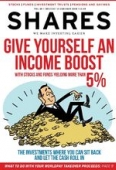Archived article
Please note that tax, investment, pension and ISA rules can change and the information and any views contained in this article may now be inaccurate.
Free Spirit toasts fantastic first year as a fund

‘It has been a good year, but it is still early days,’ says Rosemary Banyard, manager of the CFP SDL Free Spirit (GB00BYYQC271) fund, a £7.2m OEIC which has just celebrated its one-year anniversary (3 Jan 2018).
The investment objective of this concentrated fund is to achieve real growth in capital and income over the long term, through investments mainly in UK equities listed on the LSE, AIM or NEX Exchange. For Banyard, ‘real growth’ means growth in excess of CPI inflation and ‘long-term’ means over a minimum investment horizon of five years.
According to FE Trustnet, the fund has made a strong debut, returning 18.5% on a 1 year cumulative basis, ahead of the IA UK All Companies sector’s 13.4% haul and leaving the fund with a top quartile ranking. This comes despite running with high cash balances in the early months post-launch while Banyard set about deploying funds.
The highly experienced fund manager, best known in investment circles for her previous stewardship of various small and mid cap funds at Schroders, joined Manchester-based Sanford DeLand (SDL) in 2016 to launch and manage the Free Spirit fund.
This followed a late 2015 introduction to Keith Ashworth-Lord, who has garnered a healthy investor following as manager of SDL’s flagship CFP SDL UK Buffettology (GB00B3QQFJ66) fund.
The introduction proved to be a veritable meeting of minds. The pair found they shared a passion for fundamental analysis, long-term thinking and so-called ‘Business Perspective Investing’.
The latter is Ashworth-Lord’s guiding principle and a successful philosophy and strategy associated with Warren Buffett and other disciples of Benjamin Graham. Buffett apprentice Ashworth-Lord likes to quote the sorcerer himself in this regard: ‘Only an excellent business bought at an excellent price makes an excellent investment.’
IDENTIFIABLE ENTRY BARRIERS
‘Both of us start from the perspective that we are looking at the business first. It is the business that generates wealth for shareholders, not the stock market,’ explains Banyard, when quizzed on points of differentiation between Free Spirit and Ashworth-Lord’s Buffettology fund.
‘We’re agreed on the basic principles,’ she says, referring to Ashworth-Lord, ‘so the differences are in the details and the individual shares that we buy.’
The pair has different circles of competence and sector preferences. ‘My largest exposure is to IT software and services,’ says Banyard, contrasting this with Ashworth-Lord’s ‘greater comfort’ in leisure roll-outs such as Domino’s Pizza (DOM) and Restaurant Group (RTN).
‘Another difference is that I will entertain IPOs, but Keith doesn’t,’ adds Banyard, whose fund is invested in relative stock market newcomer Alfa Financial Software (ALFA), the fast growing, strongly cash generative enterprise software supplier to the asset and consumer finance industry.
Banyard looks for ‘identifiable barriers to entry’ in the businesses she backs. ‘Usually, you find evidence for barriers to entry in the return on equity, return on capital or the return on operating assets.’
MANAGEMENT NEED TO HAVE SKIN IN THE GAME
Firms that currently meet Banyard’s investment criteria include retailer Superdry (SDRY). ‘I’ve been tracking the company for some years,’ recalls Banyard. ‘Superdry has been in transition from something of a cottage industry into a very successful international branded business and we are now getting to a point where it is starting to fire on all cylinders.’
Flagging the leading portfolio position’s rapid retail, e-commerce and wholesale growth, Banyard explains: ‘Superdry generates a 20% return on equity, has a serious international business, a net cash position and quite large ownership by the founders and board of 37.6%. That is a comfort which I like.’
Other portfolio examples with significant management ownership include Craneware (CRW:AIM), the Edinburgh-headquartered healthcare software play whose management holds sway over 12.6% of the equity. ‘The weighted average management ownership of the whole portfolio is 14%,’ explains Banyard.
In the software and services sector, she likes Cambridge-based AVEVA (AVV), the engineering software company ‘in the process of quite a complex reverse takeover’ with long-run suitor Schneider Electric.
Banyard believes the deal, which will create one of Britain’s biggest software businesses, will yield material cost and revenue synergies for an enlarged group that will remain listed on the London stock market.
‘When it re-lists’, early in the opening few months of 2018, ‘it will be a business valued at over £4bn,’ says Banyard. ‘It is one of only two or three companies in the world that have software that is used by oil and petrochemical giants to design their plants. And the switching costs are very high for the customer, which gives AVEVA resilience.’
Another beneficiary of high switching costs is Fidessa (FDSA), the Woking-based fintech company and global leader in trading software systems and data to financial institutions. Banyard argues Fidessa will become ever more important to traders under new market rules called MiFID II.
STRONG PERFORMERS
Among the strong portfolio performers have been the likes of motor finance specialist S&U (SUS) and VP (VP.), the equipment rental specialist whose shares rose on the announcement of the purchase of Brandon Hire, a deal offering opportunities for geographical expansion and cost savings.
Amid a seemingly never-ending bull market that is pushing valuations higher across the board, Banyard concedes it is currently tough for her to find suitable excellent businesses at excellent prices: ‘Any new purchase has got to replace something that is already in the fund and it is challenging to find good buys.’
New investments have however included Mortgage Advice Bureau (MAB1:AIM), which is building a technology- based platform in the UK mortgage broking market. (JC)
Important information:
These articles are provided by Shares magazine which is published by AJ Bell Media, a part of AJ Bell. Shares is not written by AJ Bell.
Shares is provided for your general information and use and is not a personal recommendation to invest. It is not intended to be relied upon by you in making or not making any investment decisions. The investments referred to in these articles will not be suitable for all investors. If in doubt please seek appropriate independent financial advice.
Investors acting on the information in these articles do so at their own risk and AJ Bell Media and its staff do not accept liability for losses suffered by investors as a result of their investment decisions.
Issue contents
Big News
- Is Mothercare a takeover target after share price slump?
- Dialight banking on new leadership
- Coal hits one-year high
- Eco Atlantic gets Exxon discovery boost
- The week in a minute
- Christmas boost for grocers
- Which UK-listed stocks are affected by US tax reform?
- Where to invest your Worldpay takeover proceeds

 magazine
magazine











